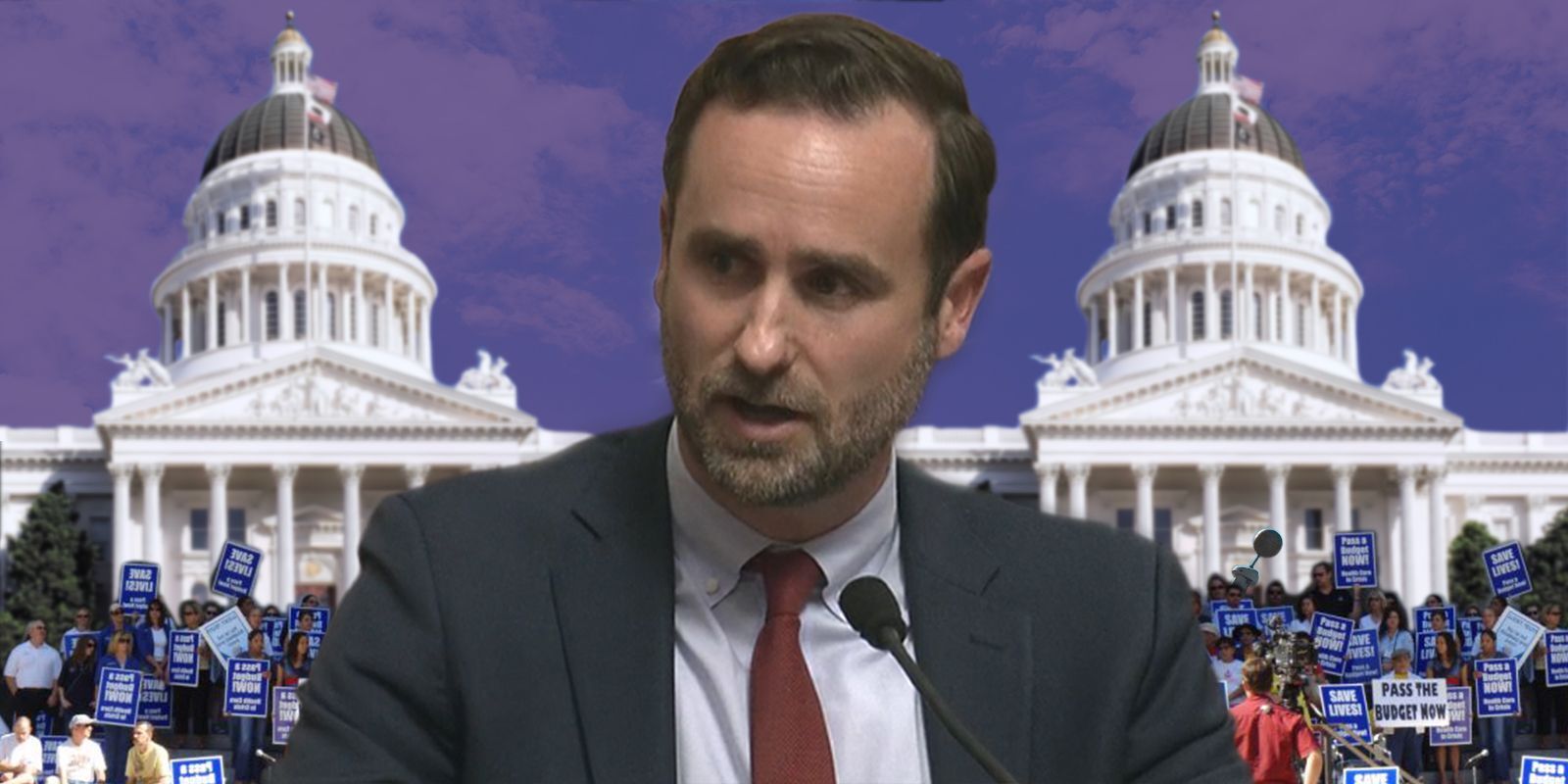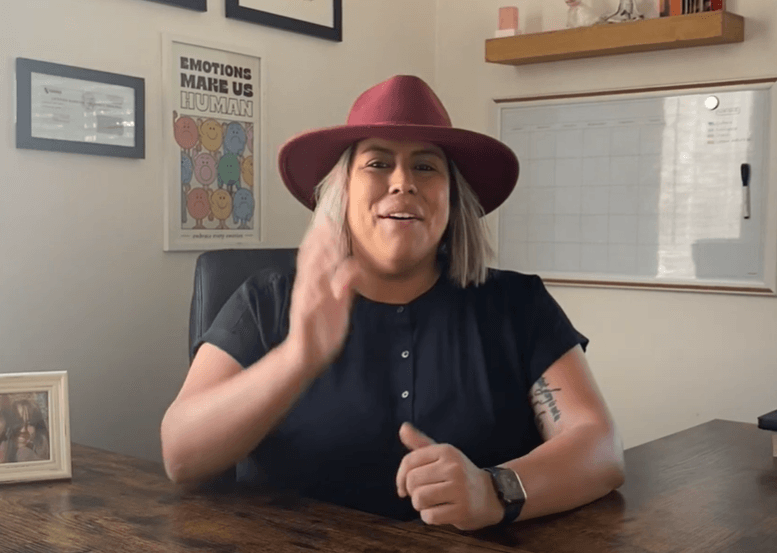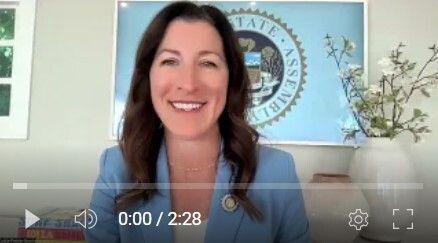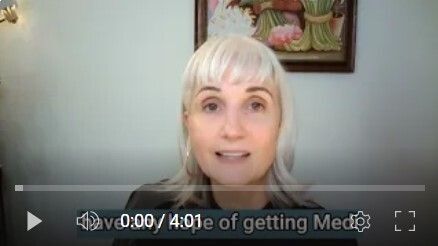CAADS in Action
We’re fighting to keep providers and participants safe.
Here’s the latest:
January 20, 2026
CAADS Asks Governor Newsom for Strengthened State Partnership
Here is what we submitted to the Governor last week to start our cost relief campaign:
Proposal to Protect Affordability and
Health for Vulnerable Californians by
Addressing the CBAS Closure Crisis
Dear Governor Newsom:
47 state legislative districts have lost a Community Based Adult Services (CBAS) center since 2020. The California Association for Adult Day Services (CAADS) needs help addressing the continuing CBAS closure crisis. We represent 316 CBAS providers that offer the State’s most cost-effective community-based alternative to nursing homes for 45,000 older and disabled Medi-Cal adults. Keeping centers open is critical because they deliver quality care to individuals, affordability to working families, and cost savings to taxpayers.
In response to new fiscal realities, CAADS is temporarily suspending our requests for higher rates. To be clear, CBAS centers still need much higher reimbursements to prevent closures, maintain access, and protect participants. However, we recognize new factors are constraining state resources. CAADS spent 2025 identifying pathways to alleviate the CBAS closure crisis and serve as partial alternatives to rate increases. Our work will continue in 2026 as we build state partnerships aimed at finding ways to make progress.
We respectfully submit the following requests for May Revision:
- Propose efficiencies in 1115 Waiver. The current waiver requires specific staffing ratios and therapy hours that are often unnecessary for delivering quality, person-centered care. Aligning these requirements with operational realities would help avoid closures.
- Direct state agencies to engage with CAADS on cost relief efforts. We are guiding stakeholder discussions to refine and implement rate increase alternatives. We kindly ask that agencies overseeing CBAS join what will likely be a multi-year project.
- Support Trailer Bill Language committing the State to making progress. The CBAS crisis is a budget problem: Decades of state disinvestment have led to 29 closures in the last five years—and growing closure risks going into the HR 1 era. CBAS providers need the State to commit to delivering cost relief and operational efficiencies to stop CBAS closures and protect participants from higher-cost nursing homes.
THE STAKES ARE HIGH: WORKING FAMILIES DEPEND ON CBAS AFFORDABILITY
CBAS is increasingly key to achieving state budget resilience and state policy goals:
- EXTREMELY LOW COST – CBAS protects families, taxpayers, and state leaders by costing up to 8 times less than nursing homes & 4 times less than home health aides.
2024 Annual Median Costs for Long-Term Care (Genworth 2025)
| California | National | ||
|---|---|---|---|
| CBAS / Adult Day | $23,400 | $26,000 (more than CA) | |
| Home Health Aide | $89,200 | $77,800 | |
| Nursing Home | $140,300 to $182,100 | $111,300 to $128,000 |
- STATEWIDE HCBS ACCESS GAPS – DHCS notes less than half of counties have access and 16 counties have only 1 center, creating statewide gaps that need filling as California ages. HCBS helps reduce long term care costs (January 2025).
- CalAIM & BEYOND – Stabilizing CBAS is required to succeed with Community Supports & Enhanced Care Management; address homelessness since CBAS links people to housing; and achieve Goals 2, 4, and 5 of the Master Plan for Aging.
Despite its importance to state finances and goals, CBAS remains financially unstable:
- CLOSURE RISKS – 29 CBAS centers serving constituents in 47 legislative districts have closed since 2020—due to factors unrelated to the COVID Pandemic.
CBAS Closures since 2020 (CAADS September 2025)
- STATE DISINVESTMENT – Growing closure risks stem from the State’s published Medi-Cal rate remaining flat for decades as CBAS costs continue rising with inflation.
Flatlining Medi-Cal Reimbursements in Context
| 2006 | 2026 | Increase | |
|---|---|---|---|
| CBAS Rate | $76.22 | $76.27 | 0% |
| Gallon of Gas | $2.42 | $4.56 (EIA) | 88% |
| Nursing Home Rate (Average) | $152 (CHF) | $325 (DHCS) | 114% |
TABLE DATA SOURCE LINKS:
EIA CHF DHCS
California must make progress on stabilizing CBAS operations despite new constraints:
- INACTION IS HARMFUL – HR 1 makes rate increases less likely in the near-term. We thus need alternatives to help preserve CBAS and protect a key state program.
- PROGRESS IS POSSIBLE – CAADS is building three strategic pathways for helping CBAS centers stabilize operations and helping the State mitigate HR 1 fiscal issues.
| Stabalization Pathways | Strategic Goal | Sample Proposal | |
|---|---|---|---|
| COST RELIEF | Shrink rates-costs gap | Protect quality and increase efficiency by reducing unneeded staff ratios and therapy hours. | |
| ADMINISTRATIVE EFFICIENCIES | Reducs duplications | Extend ERS streamlining by further reducing duplicative paperwork for MCOs and providers. | |
| REVENUE ALIGNMENT | Cover unpaid work | Use existing funding streams like ERS to pay for unreimbursed staff time on absence checks etc. |
California must make progress on rate increases after mitigating near-term pressures.
- ALTERNATIVES ARE MINOR & PARTIAL SOLUTIONS – Cost relief and similar solutions will let steam out of the kettle. But fully addressing the CBAS closure crisis will require ending decades of state disinvestment once HR 1 impacts become clearer.
- PARTNERSHIP IS POWERFUL – We will revisit our earlier rate increase campaign as conditions become clearer. We appreciate our state partners being open to collaborate on alternatives for addressing CBAS instability and making progress on the closure crisis—all of which will lay the foundation for future rate discussions.
As part of the 2026 Budget process, providers need partners to begin helping generate, refine, and implement alternative solutions for addressing the CBAS closure crisis. Please consider making CBAS sustainability part of May Revise, including by supporting TBL recommitting the State to making CBAS more stable. Thank you for your consideration.
Sincerely,
Brian Rutledge, PhD
Executive Director
California Association for Adult Day Services
January 15, 2026
New Cost Relief Campaign to Address CBAS Closure Crisis
This week CAADS kicked off our 2026 advocacy efforts by sending a budget request to Governor Newsom. Our goal hasn’t changed from last year:
WE’RE FIGHTING TO ADDRESS
THE CBAS CLOSURE CRISIS
THAT’S STATEWIDE
& ONGOING.
Federal data shows operating costs for Community Based Adult Services (CBAS) centers have more than tripled over the last three decades (and likely quadrupled if California’s higher costs could be disaggregated from national averages). Meanwhile, California’s published Medi-Cal rates have flatlined, growing 0% since 2006.
Decades of state disinvestment are thus fueling a growing gap between provider costs and provider reimbursements, destabilizing CBAS finances and operations. And that’s still our north star: We’re asking state leaders to help us address the CBAS closure crisis by making progress on closing the rates-costs gap.
RATES-COSTS GAP
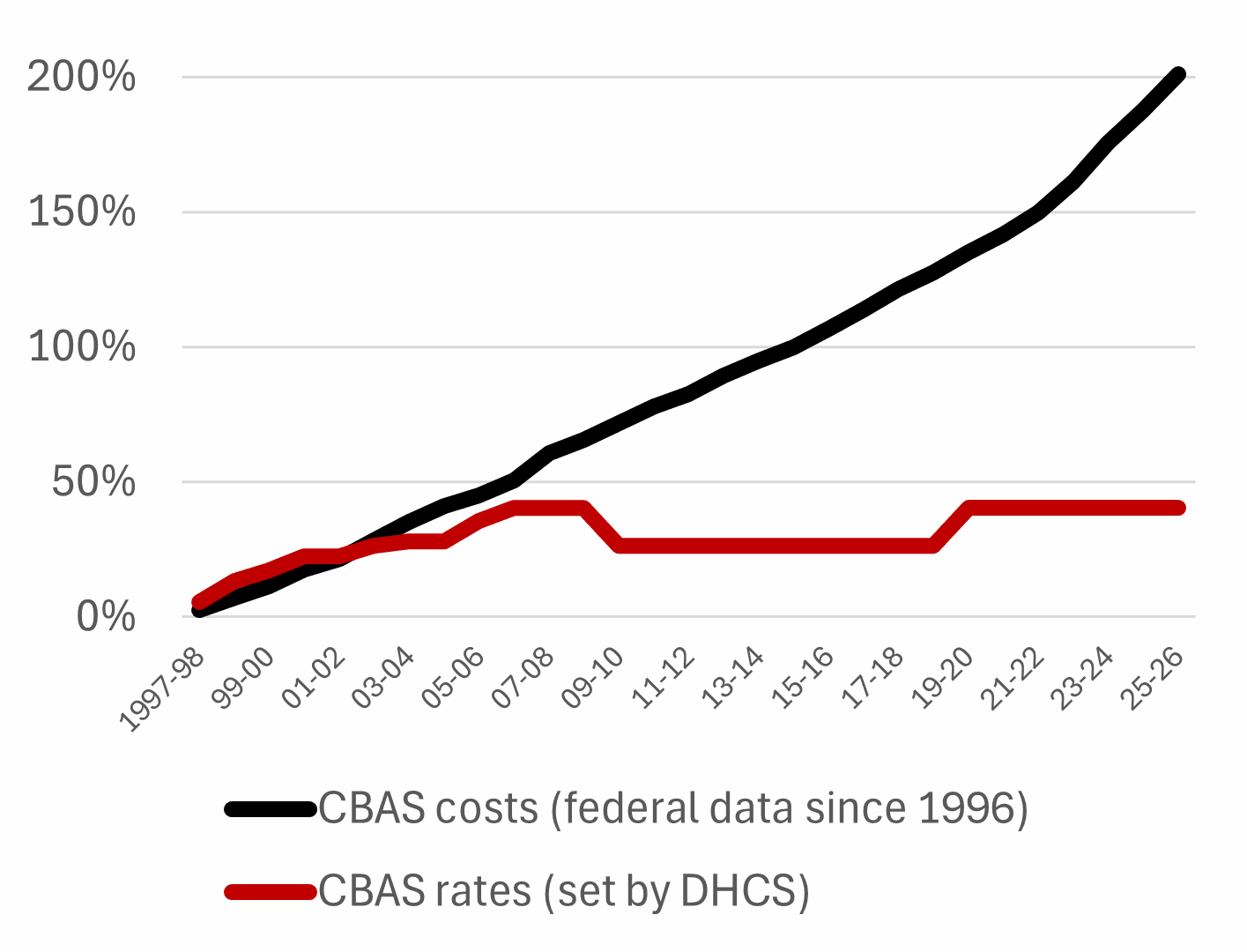
What we are changing is our approach. Funding cuts are impacting California’s budget, causing a projected deficit of $3 billion to $18 billion in 2026-27 and larger deficits in future years. State leaders currently have little room to consider CBAS rate increases.
So in 2026, CAADS is advancing a new approach:
WE’RE SEEKING COST RELIEF
AS A PARTIAL SOLUTION
& CRITICAL BRIDGE
To be clear, CAADS will continue fighting for major rate increases in future years, once state budget conditions become clearer. The only way to sustainably strengthen and grow the program will be to end decades of state disinvestment via higher reimbursements.
But going into 2026, our new cost relief agenda aims to create three partial alternatives to higher rates – alternatives that will help reduce provider costs and stabilize CBAS finances. We’re asking the Governor and Legislature for help creating:
· COST SAVINGS – Find ways to lower staffing & other operational costs.
· ADMINISTRATIVE EFFICIENCIES – Reduce duplicative & unnecessary workload.
· REVENUE ALIGNMENT – Cover unpaid work using existing payment streams.
In January, CAADS will meet with the Governor’s Office, DHCS, CDA, DDS, and legislative staff in January, and ramp up our campaign in the coming months. Stay tuned for more.
January 14, 2026
CBAS Closure Crisis – 47 Legislative Districts Lost a CBAS Center since 2020
We’re updating our analysis of the closure crisis facing Community Based Adult Services (CBAS) centers. A new map shows 29 centers have shut down since 2020, impacting 39% of all Assembly and Senate Districts:
CBAS Closures since 2020
The geographical reach demonstrates CBAS centers are struggling statewide. And the root cause is not a mystery: reimbursement rates fail to cover operating costs. In 2006, the State’s published CBAS rate was $76.22 to pay for one CBAS participant for one day of service. Two decades later, the rate is only 5¢ higher at $76.27. Meanwhile, inflation has eroded the program’s financial stability.
Californians understand how difficult it is to manage rising costs. A gallon of gas was $2.42 in early 2006 and $4.31 in early 2025 – about an 80% increase. If your family’s income stayed flat for years on end, and if you needed to keep paying for things that kept getting more expensive, you would struggle to cover basic expenses. That’s what is happening to CBAS centers. That’s what is driving these continuing closures.
Below are lists of recent closures by state legislative districts:
CBAS Closures by Assembly District
Assembly District 6 | Krell | 1 Closure (Help to Recovery)
Assembly District 7 | Hoover | 2 Closures (Rancho Cordova ADHC + Eskaton ADHC)
Assembly District 12 | Connolly | 1 Closure (Marin ADHC)
Assembly District 13 | Ransom | 1 Closure (Active Life ADHC)
Assembly District 14 | Wicks | 2 Closures (Guardian ADHC + ASEB - Berkeley)
Assembly District 17 | Haney | 1 Closure (SteppingStone - Presentation Day Health)
Assembly District 20 | Ortega | 1 Closure (ASEB - Hayward)
Assembly District 21 | Papan | 1 Closure (Mills-Peninsula Senior Focus Center)
Assembly District 22 | Alanis | 1 Closure (Turlock ADHC Center)
Assembly District 38 | Bennett | 1 Closure (Ventura County ADHC)
Assembly District 40 | Schiavo | 1 Closure (San Fernando Valley ADHC)
Assembly District 47 | Wallis | 1 Closure (Neurovitality)
Assembly District 51 | Zbur | 1 Closure (Ocean Community Care)
Assembly District 52 | Caloza | 1 Closure (Everlasting ADHC)
Assembly District 53 | Rodriguez | 1 Closure (Casa Colina ADHC)
Assembly District 61 | McKinnor | 1 Closure (Prairie Place ADHC)
Assembly District 63 | Johnson | 1 Closure (St. Christopher ADHC)
Assembly District 68 | Valencia | 2 Closures (Santa Ana V.I.P. ADHC + Sultan ADHC)
Assembly District 69 | Lowenthal | 1 Closure (Salida del Sol ADHC)
Assembly District 74 | Davies | 1 Closure (San Clemente Leo Fessenden ADHC)
Assembly District 77 | Boerner | 1 Closure (Glenner Alzheimer's Family Centers (Encinitas))
Assembly District 78 | Ward | 1 Closure (Hope ADHC)
Assembly District 79 | Sharp-Collins | 3 Closures (Neighborhood House Assoc. + Mollison ADHC + Elm Center ADHC)
Assembly District 80 | Alvarez | 1 Closure (Glenner Alzheimer's Family Centers (Chula Vista))
CBAS Closures by Senate District
Senate District 2 | McGuire | 1 Closure (Marin ADHC)
Senate District 4 | Alvarado-Gil | 1 Closure (Turlock ADHC)
Senate District 5 | McNerney | 1 Closure (Active Life ADHC)
Senate District 6 | Niello | 3 Closures (Help to Recovery + Rancho Cordova ADHC + Eskaton ADHC)
Senate District 7 | Arreguin | 2 Closures (Guardian ADHC + ASEB - Berkeley)
Senate District 10 | Wahab | 1 Closure (ASEB - Hayward)
Senate District 11 | Wiener | 1 Closure (SteppingStone Presentation Day Health)
Senate District 13 | Becker | 1 Closure (Mills-Peninsula Senior Focus Center)
Senate District 18 | Padilla | 2 Closures (NHA + Glenner Alzheimer's Family Centers - Chula Vista)
Senate District 19 | Ochoa Bogh | 1 Closure (Neurovitality)
Senate District 21 | Limón | 1 Closure (Ventura County ADHC)
Senate District 22 | Rubio | 1 Closure (Casa Colina ADHC)
Senate District 24 |Allen | 1 Closure (Ocean Community Care)
Senate District 26 | Durazo | 1 Closure (Everlasting ADHC)
Senate District 27 | Stern | 1 Closure (San Fernando Valley ADHC)
Senate District 28 | Smallwood-Cuevas | 1 Closure (George G. Glenner Alzheimer's Family Centers (Encinitas))
Senate District 32 | Seyarto | 1 Closure (St. Christopher ADHC)
Senate District 33 | Gonzalez |1 Closure (Salida Del Sol ADHC)
Senate District 34 | Umberg | 2 Closures (Santa Ana V.I.P. ADHC + Sultan ADHC)
Senate District 35 | Richardson | 1 Closure (Prairie Place ADHC)
Senate District 36 | Strickland | 1 Closures (San Clemente Leo Fessenden ADHC)
Senate District 39 | Weber Pierson | 2 Closures (Mollison ADHC + Elm ADHC)
Senate District 40 | Jones | 1 Closure (Hope ADHC)
Reach out to Brian Rutledge, our Executive Director, with any questions or to share information about closures in your area: brian@caads.org.
September 4, 2025
Budget Advocacy – How Trump’s Medicaid Cuts Are Reshaping California’s Budget
We have new info about how Trump’s Medicaid cuts will impact California’s state budget:
· State leaders see “tremendous challenge” ahead – Jesse Gabriel from the San Fernando Valley is the Assembly Budget Chair. At a recent budget hearing, he stressed that Trump’s Medicaid cuts will create major budget gaps for California. He asked that stakeholder groups (such as CBAS providers) realize how challenging the next few years will be in terms of financial deficits and resource limits.
· Massive pressure on Long Term Services and Supports (LTSS) – SCAN Foundation just released a new analysis of state budget cuts and federal budget impacts. The details demonstrate that older Californians and people with disabilities will be disproportionately impacted by the State’s current and future financial challenges.
· CBAS providers have done well so far amidst growing uncertainty – California is already experiencing a difficult budget year. (The Current Fiscal Year lasts from July 2025 through June 2026). The PACE program, for example, is facing tens of millions of dollars in cuts (see SCAN’s analysis above). And it is going to get worse as state leaders respond to Trump’s Medicaid cuts. So far, CAADS advocacy has succeeded in protecting CBAS providers against growing pressures.
With all of this in mind, we’ll continue fighting to stabilize CBAS. The published CBAS reimbursement rate has flatlined since George W Bush was President – in 2006, the rate was $76.22 (compared to $76.27 today). Meanwhile, inflation has dramatically increased operating costs – resulting in an accelerating financial crisis and regular closures. So we cannot stop pushing for sustainability. But going forward, we will have to do so in a way that recognizes California is entering an era of major financial limits.
August 18, 2025
Raise Our Rates – Where We’re Going Next
State and federal policymakers are about to return from vacation. And as they fly back to Sacramento and Washington, CAADS will be preparing for our next round of advocacy. What should you expect to see happening in the next few months?
We’ll be focused on analyzing and communicating new circumstances:
· Less safety for participants – The Trump Administration’s One Big Beautiful Bill is bad for Californians and bad for Adult Day Services (see this overview and this one). The bill will have direct impacts on an unknown number of participants and their families. For example, it’ll be harder to stay on Medi-Cal, access public assistance for groceries, or feel safe from ICE raids.
· Worse state budget conditions – The bill will also indirectly impact CBAS providers by making it much harder to win rate increases (see this analysis for context). California and other state governments will have much less funding and less flexibility with both Medicaid funding and state General Fund dollars. State leaders will thus have more financial problems and fewer resources.
We’ll continue to advance our core objectives while adapting them as necessary:
· CBAS financial stability – The primary goal is still moving the Raise Our Rates campaign forward. We do, though, anticipate needing to adjust our methods and conversations for achieving financial stability. For example, Trump’s bill is likely to blow massive holes in California’s budget. So, we’re positioning ourselves to protect CBAS against any future threats.
· ADP/ADVP support – CAADS also fights for the social model. In 2025, we got AB 1172 amended to clarify the bill and supported SB 582 to try and waive ADP licensing fees in emergency situations. We also joined other Sacramento groups in creating the Aging and Disability Coalition (ADC), a cross-cutting voice for challenging problematic federal changes to Long Term Services and Supports. (See our Statement of Solidarity and our pro-Administration for Community Living flyer.) Going forward, we anticipate similar engagements as new state and federal proposals emerge.
We’ll be updating CAADS members regularly. Look out for updates over the next few months. More info will soon be available on the state budget situation and on CAADS’ efforts going into 2026. Oh, and don’t forget to Save the Date for Fall Conference: November 10-12, 2025, at the Hotel Fera in Anaheim! See you there!
CAADS Executive Director in Action April 15, 2025 - Watch the video below for a recap of the action!
Use the following link to see our official budget request for $74.8 million to raise our rates: https://caads.org/file_download/bb9e5c13-1e04-4b61-beaf-0038e39be98a
November 25, 2024
Raise Our Rates Campaign Kicks Off Again to Make CBAS Revenue Sustainable
September 17, 2024
Governor Newsom Vetoes AB 2428, What Now?
August 26, 2024

